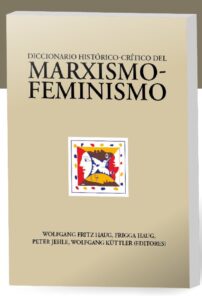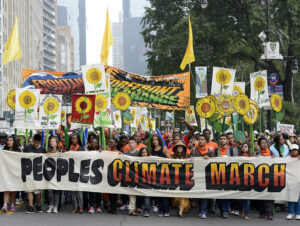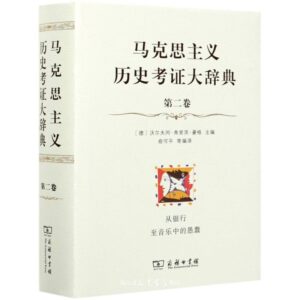
By Ana Miranda Mora
The term Marxism-Feminism brings together the history of women’s, or feminist, movements and their alliances and disagreements with the workers’ movements, as well as a set of theoretical debates around reproductive work, the sexual division of labor, female activism, the role of women in the family, the role of wages in female subordination, the place of control over female reproductive ability, the sexualized female body in the accumulation of capital, the relevance of gender relations for the critique of political economy, among others. By incorporating the point of view of women, feminists in Europe and the Americas were able to revolutionize Marxism in the 1960s and 1970s.
The ambiguity of the term emerges from two main positions: on the one hand, a form of Marxism that neither includes nor believes it necessary to integrate feminist debates in its critique of capitalism; on the other hand, a feminism that considers Marxism as an unfinished theoretical framework when expounding on female oppression. Thus, the term has been used mostly in mentioning materialist or socialist feminists; and can be understood as a program of fundamental transformation for the Marxist emancipatory project.
In this context, two phases can be distinguished when addressing the relationship between feminism and Marxism. On the one hand, the expansion of Marxist analysis due to the influence of feminism; on the other, the development and reassessment of categories and problems in feminist theory arising from critiques of Marxism, or dialogue with it. In the introduction to her book Women and Revolution, Lydia Sargent argues that the danger of materialist and socialist feminism lies in their differences disappearing as they are diminished and made invisible:
“how can women understand their particular oppression in a way that can confront the narrowness of Marxist terminology (as used by the men in the movement) which focuses on work and economic relations as the primary (sometimes only) area of importance; and how can they develop a new theory which understands the importance of reproduction, family, and sexuality as central to current analyses and future visions?” (1981, XVIII)
The risk pointed out by the US feminist rests not only in the historical disagreements between different groups within academia and among women’s or feminist and workers’ movements but especially in the development of certain problems and theoretical debates that are central and pertinent to political economy.
Marx and Engels’ contribution to feminist thought is undeniable. Discourse on the relations between men and women, the woman’s role in the factory and the family, arguments against the sexual division of labor, and assertions on the importance of the family for the economic-political analysis of society appear in several works of both authors. In The German Ideology (1845-46) it is noted, for example, that the division of labor is historically specific, and must be studied from this perspective.
“The production of life, both of one’s own in labour and of fresh life in procreation, now appears as a twofold relation: on the one hand as a natural, on the other as a social relation […]. . It follows from this that a certain mode of production, or industrial stage, is always combined with a certain mode of co-operation, or social stage, and this mode of co-operation is itself a ‘productive force’” (MEW 3, 30; 1976, 48 et sq.).
However, the problematization of female oppression by these German thinkers does not translate into a critical theory of gender relations as such. This is due less to a lack of ‘feminist consciousness’ or to the prejudices of the time, rather than limitations within their theory. Their analyses and critiques of female and child labor, the bourgeois family, prostitution, and other issues are mainly based on moral categories or problematic anthropological studies, which obscure the constitutive character of gender relations for the capitalist form of production. Marx and Engels criticize the system of relations by which the production of means for life is socialized, while the reproduction of life seems to not be a social matter and exclusively refers to the individual and private life.
The problem lies in that by approaching the problem in the way they did, Marx and Engels only confirmed that gender relations are something external and supplementary to relations of production, or else that these are reduced to class relations. Thus, they diminished gender relations to a cultural or ideological problem, either by subsuming them to the notion of class or by identifying them with it. As Frigga Haug points out in her paradigmatic article “Gender Relations”:
“In the workers’ movement, that foreshortening led to the adoption of a theory of the succession of the struggles for liberation, in which it was forgotten that gender relations are always also relations of production, and thus how strong are the relations of reinforcement and support for the reproduction of the current form of relations in their totality. The relations of production cannot, therefore, be revolutionized first and, only later, the gender relations” (2001, 285).
Therefore, none of these relations can be understood, without answering the question of how the production of life is embedded into the relations of production and vice versa, and what relation can be found between the production of life and the production of the means for life. Against this backdrop, in which any relation or association of feminism and the women’s movement with Marxism implies the risk of a dilettante or naive surrender, Haug asks:
“is it possible to transform Marxism to make it useful for feminism? […] Conversely, can Marxism become a livelier, broader, and more universal Marxism through a feminist reworking? Is there a specifically Marxist approach to reality that, when considered from a feminist point of view, could bring to light a different truth” (2011, II)?
The affirmative answer of some women to this question made the first feminist irruption possible in the field of critical thought set in motion by Marx and Engels. In this sense, both were –and still are– the main enemies and allies of many feminists. By intervening and turning the German duo’s theory on its head, and incorporating the question of gender relations, until then forgotten or invisibilized, socialist and materialist feminisms were able to reveal a constellation of theoretical and practical problems for political economy that had been previously downplayed or marginalized. Thanks to this alliance in permanent tension, new themes and approaches emerged. Feminist-Marxist theory involves the formulation of a challenge and expansion of the political-economic analysis of Marxism, making possible both anti-capitalist feminism and feminist Marxism.
In this constellation of problems, three central debates can be identified: the discussion on productive and reproductive work, and more recently its relationship with caregiving; the dispute over the sources of female oppression, that is, the relationship between patriarchy and capitalism; and, finally, the controversy over the terms of the relationship between two fundamental categories to these theories: gender and class. The rediscovery of this new Marx and Engels by feminists of the 1970s and 1980s; such as Mariarosa Dalla Costa, Selma James, Leopoldina Fortunati, Kate Millet, Shulamith Firestone, Carole Pateman, Gayle Rubin, Sheila Rowbotham, Silvia Federici, Maria Mies, Frigga Haug, Roswitha Scholz, Mirta Henault, Isabel Larguía, John Dumoulin, Julieta Kirkwood, and Elena Urrutia, would make possible the critique of the notion of labor, the politicization of sexuality and personal experiences in search of a theory capable of explaining the roots of female oppression without reducing the critique to class conflicts. The Argentine feminist Martha E. Gimenez defines Marxist feminism as “a theoretical position […] that seeks to develop the potential of Marxist theory to understand the capitalist sources of women’s oppression” (2000).
Thus, since the 19th century, attempts to establish cooperative relations between women’s and workers’ movements, between Marxism and feminism have been heterogeneous and often contradictory. As Cinzia Arruza points out in her book Dangerous Liaisons: The marriages and divorces of Marxism and Feminism, “Outcomes have been controversial, ranging from exhaustive attempts to maintain a difficult relationship to an outright divorce” (2015, 19). Therefore, it is worth emphasizing what they agree on: although patriarchy does not originate in capitalism, it has been completely integrated into it. The historical, socio-political, and theoretical relationship between gender and class, as well as the possibility, or not, of elaborating a theory that combines Marxism and feminism without reducing one or the other, is the challenge of contemporary Marxisms and left-wing feminisms. Furthermore, the study of alliances between Marxisms and feminisms is relevant to understand the genealogy of feminisms in various latitudes. As well as to formulate tools for a theory of patriarchal capitalism that helps us to delve into the different relationships between exploitation, oppression, violence, and domination to which women and feminized bodies are subjected.
The important thing about this intersection is that the interaction results in a mutual redefinition. On the one hand, it is a matter of recovering Marx and Engels‘ proposal through the revisionist lens and the elaboration brought to the debates being raised by socialist and materialist feminism. Here we can also add indigenous, anti-racist, anti-colonialist, popular, and transfeminist feminism. On the other hand, the proposal of a feminist Marxism, or a Marxist feminism, consists in investigating and analyzing the relations between the organization of sexuality, the relations of reproduction and caregiving, household work, and kinship relations in connection with the historical changes in the mode of production and in the form of labor, not to exclude the forms of appropriation, expropriation and capitalist exploitation as a whole. Namely, for feminism, it is a matter of recovering the analysis of political economy in its critique of social organization and life, and conversely; for the analysis of political economy, regaining the analysis of gender and sexuality, in its critique of the relations of production of capital.
In this framework, it is inescapable to reconsider these debates in connection with Latin America’s context. To ask ourselves again about the genealogies of both the Latin American feminist and labor movements and their relations with movements in Europe and the Global North. It is a matter of disrupting Marxism-Feminism from a Latin American perspective. In this regard, the recent publication of the Historical-Critical Dictionary of Marxism-Feminism (HKWF) in Spanish is a giant step forward. This volume brings together a set of categories and debates that were central to feminisms in Europe and, undoubtedly, worldwide in recent years. Given its particularity and specificity, it offers Latin America a bridge to situate these discussions and mobilizations temporally and spatially. To this end, the book’s careful translation (undertaken by a large team of translators) manages to provincialize Europe by approaching it in a situated manner for engaging dialogue, while also making the articles originally written in German more accessible. In this respect, it constitutes an open-ended project that works on emancipatory knowledge.
The selection of entries made by Julia Espósito, Haydeé García Bravo, and Gabriela Mitidieri weaves together a genealogy of demonstrations, debates, and dissidences that, although in many cases are not strictly Latin American, make up a part of our history. This exercise of historicizing and mapping concepts and struggles brings forth a new approach to the understanding of the relationship between feminisms and Marxisms. By situating this thought, the diversity and heterogeneity of the different traditions and approaches from which the dictionary entries were written are emphasized. The choice of topics is determined by a theoretical and activist-feminist tradition linked to Marxism. It is a feminism that critically recovers the materialist and dialectical method of Marx and Engels to consider the relation between capitalism and patriarchy as a complex and contradictory relationship and process. The aim is to show that these Marxist feminisms constitute a tradition of thought and struggle that, as the three Latin American prologue authors in charge of the selection rightly point out, is full of friendships and sisterhoods, debates and struggles, as well as hegemonies and resistances. Thus, this compilation (edited by Mariela Ferrari, Victor Strazzeri, and Miguel Vedda, with the collaboration of Alex Wischnewski) explicitly identifies a set of common interests and problems, while at the same time highlighting the limits and differences, without ignoring the asymmetries.
This volume provides a specific angle from which to problematize the debates outlined above on productive and reproductive labor, the sources of female oppression, and the relationship between gender and class. The dictionary entries reconstruct and analyze events, practices, and concepts such as female/familial/domestic/housewifizated labor; witch-hunting, the body and birth control; the ontological and social category of woman or femininity, sex, and gender; the definition of feminism, women’s movement, Marxism-Feminism, materialist feminism, and feminist theology; key political phenomena and concepts such as emancipation, democracy, ethics, poverty, third world, misogyny, and feminist categories such as heteronormativity, homosexual, lesbian, and masculinity. This Latin American edition of the dictionary is a call to ponder the concepts, debates, and mobilizations linked to the conditions in which they emerged, and the socioeconomic and geopolitical context in which they have been coined. It is also a lucid invitation on the part of the prologue writers and translators to open up debates and dialogues between the global North and South, thus promoting the second irruption in Marxism-Feminism from Latin America.
Trans. by Paul Holzman
Ana María Miranda Mora holds a Ph.D. in Political Philosophy (2021) from the National Autonomous University of Mexico (UNAM). She is currently a DAAD postdoctoral fellow at the Center for Interdisciplinary Gender Research in Innsbruck, Austria. She teaches Gender Studies and Queer Studies at the Alice Salomon Hochschule (ASH) in Berlin. Her research interests are care work and global care chains, sexualized violence and femicide, feminist rage, feminist legal theory, post-, and decolonial feminism, political and social philosophy, and classical German philosophy (esp. Hegel, Engels-Marx, and Benjamin).
Bibliography
M. Gimenez, “What’s material about materialist feminism?”, in: Radical Philosophy 101 (May-June 2000) (www), at: <https://www.radicalphilosophy.com/article/whats-material-about-materialist-feminism> [12th August 2022].
F. Haug, “Vorwort”, in: Historisch–Kritisches Wörterbuch des Feminismus, vol. 2: Hierarchie / Antihierarchie bis Köchin). Hamburg 2011, I-V.
Id., “Gender Relations” [2001]. Trans. by P. Thomas. In: Historical Materialism 13/2 (2005), 279-302 (www), at: https://doi.org/10.1163/1569206054127192 [12th August 2022].
K. Marx y F. Engels, Werke, Vol. 3, Berlin 1969, 5-530.
Id., The German Ideology. Trans. by W. Lough. Moscow 1976.
L. Sargent, Women and Revolution. A discussion of the unhappy marriage of Marxism and Feminism. New York 1981.



